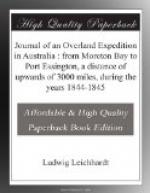August 25.—We accordingly started early, and travelled for several miles through a pretty open broad-leaved tea-tree forest, formed by small trees from twenty to thirty feet high. This changed, however, into dense scrub, which we could only avoid by keeping more to the westward, in which direction the tea-tree forest seemed to extend to a great distance. Here we passed several tea-tree swamps, dry at this time, level, like a table, and covered with small trees, and surrounded by a belt of fine box-trees and drooping water-gum trees. In order to come to a watercourse, I again crossed the thick scrub which covered the undulations of iron-stone to the northward, and came to a fine rocky creek, which Brown recognised as one of those he had seen, but which contained only salt water lower down. We consequently continued our journey to the north-west, through tea-tree forest, and over some very large tea-tree swamps, and came at last to a creek and to a small river, along which we travelled until darkness compelled us to encamp. It had fine water-holes, and was densely shaded with drooping tea-trees; but the holes were dry, with some few exceptions of small wells of the natives. The latitude of our camp was 17 degrees 25 minutes.
We had seen a great number of pigeons and white cockatoos, and we were sure that a greater supply of water was near, as many patches of burnt grass showed that the natives had been here very lately. Next morning, the 26th, when Charley returned with the horses, he told us that we had passed a fine lagoon, not a mile and a half off, at the left bank of the river, which the night had prevented us from seeing, and which the horses had found when returning on their tracks. We moved our camp to this lagoon, which was covered with Villarsia leaves, and contained a reddish water coloured by very minute floating bodies of that colour. The natives had surrounded it with dry sticks, leaving an opening on one side, for the purpose of taking emus, as before described. These birds were very numerous, and lived exclusively on the fruit of the little Severn tree, which was excessively bitter and imparted its quality to the meat; Charley and Brown, assisted by the dog, killed one of them. A cockatoo was shot, which in form and colours resembled the large white cockatoo, but was rather smaller, and the feathers of the breast were tipped with red. We saw the bones of a Jew fish, and a broken shell of Cymbium, in an old camp of the natives near the lagoon.
The apple-gum, the box, and the Moreton Bay ash composed a very open well-grassed forest, between the lagoon and the river; the latter had an E. N. E. and almost easterly course. I called this river or large creek, “Smith’s Creek,” after Mr. Smith, a gentleman who had shown us the greatest kindness and attention when we were staying at Darling Downs.




